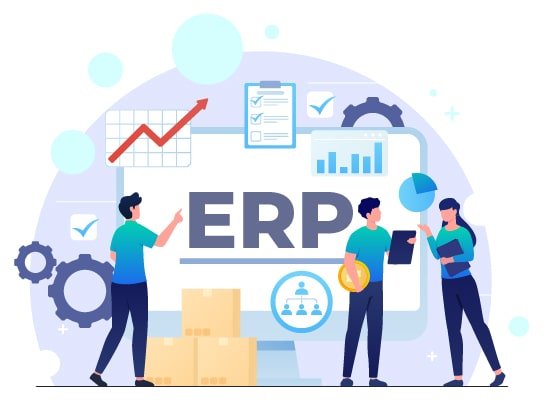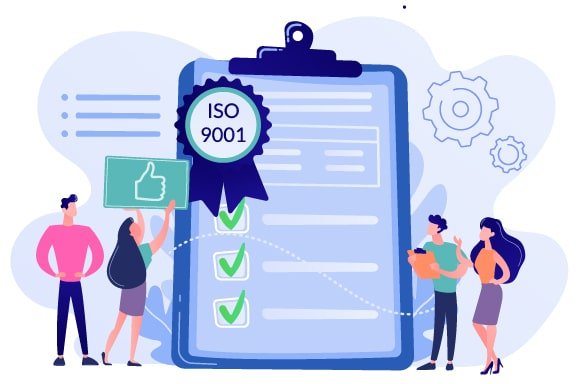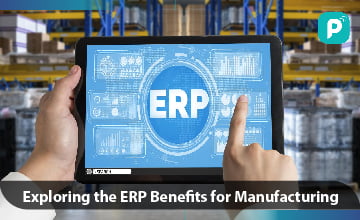Implementing an Enterprise Resource Planning (ERP) system can offer numerous advantages for your manufacturing business. Designing this comprehensive solution aims to automate and streamline a range of daily business operations, such as accounting, compliance, supply chain processes, project management, customer relations, and risk management. The consolidation of these functions into a unified core location enhances operational efficiency and facilitates seamless coordination. In this blog, we will get into the ERP benefits for manufacturing and their comprehensive study!

ERP Benefits for Manufacturing – Enhanced Operational Efficiency
Streamlining processes, integrating data management, and automating contribute to achieving enhanced operational efficiency in ERP manufacturing.

Streamlined Processes
One of the primary contributors to enhanced operational efficiency is the streamlining of processes, which is a key ERP benefit for manufacturing. ERP systems seamlessly integrate and coordinate various functions within a manufacturing organization through purposeful design.
Integrated Data Management
ERP systems serve as a centralized hub for data management in manufacturing. They integrate data from different departments and functions, breaking down data silos that can lead to inefficiencies and errors.
Optimized Workflows
ERP systems optimize workflows by creating logical and efficient sequences of tasks. For instance, in production planning, the system can analyze demand forecasts, allocate resources, and generate production schedules automatically. This optimization leads to reduced lead times, efficient resource utilization, and improved overall productivity.
Reduced Manual Errors
Manual data entry is prone to errors, and these errors can have cascading effects throughout the manufacturing process. ERP systems significantly reduce the reliance on manual data entry by automating data capture and processing.
Improved Supply Chain Management
One of the key ERP benefits for manufacturing is in optimizing supply chain management.

Facilitating Coordination
One of the primary functions of ERP systems in the manufacturing industry is to facilitate seamless coordination across the entire supply chain. This includes suppliers, manufacturers, and distributors. ERP consolidates and makes information related to orders, inventory levels, production schedules, and shipments accessible to relevant stakeholders, serving as a central platform.
Improved Inventory Management
ERP systems contribute significantly to improving inventory management within the manufacturing supply chain. By providing real-time visibility into inventory levels, both raw materials and finished goods, organizations can optimize stock levels.
Reduced Lead Times
ERP systems play a pivotal role in reducing lead times throughout the supply chain. By automating processes and providing real-time insights, these systems enable quicker decision-making.
Timely Adjustments to Production Schedules
One of the strengths of ERP systems is their ability to adapt to changing circumstances. When there are fluctuations in demand or unexpected events impacting the supply chain, ERP systems allow for real-time adjustments to production schedules.
Quality Control & Compliance
Quality control and compliance management are integral components of ERP manufacturing solutions.

Enforcing Quality Standards
Designed to enforce and maintain stringent quality standards throughout the production process, ERP manufacturing solutions play a crucial role. These systems integrate quality control measures at every stage, from raw material procurement to finished product inspection.
Tracking Product Quality
One of the key functionalities of ERP systems in manufacturing is the ability to track product quality in real-time. Through the integration of sensors, monitoring devices, and data analytics, these systems continuously collect and analyze information about various aspects of the production process.
Ensuring Compliance with Industry Regulations
Compliance with industry regulations is a critical aspect of manufacturing operations, especially in sectors with stringent standards. ERP benefits for manufacturing make this industry easily run and regulated.
Integration of Quality Control Processes
ERP systems integrate quality control processes into the overall manufacturing workflow. This means that quality checks and inspections are not standalone activities but are embedded seamlessly into the production process.
Enhancing Product Quality
By enforcing quality standards and integrating quality control processes, ERP manufacturing solutions contribute significantly to enhancing the overall quality of products. Achieving this involves early detection and correction of defects, ensuring that only products meeting the required standards are released.
Reducing Defects
ERP systems aim to minimize defects in the manufacturing process by identifying and addressing issues in real-time. Automated quality checks and continuous monitoring help in reducing the occurrence of defects and deviations from established quality standards.
Mitigating Compliance Risks
Non-compliance with industry regulations poses significant risks to manufacturing operations. ERP systems help mitigate these risks by providing a centralized platform for adherence to regulatory requirements.
Cost Reduction & Financial Management
ERP systems contribute to cost reduction and efficient financial management in the manufacturing industry.

Automation of Financial Processes
One of the key contributions of ERP systems to the manufacturing industry is the automation of various financial processes. These systems streamline tasks such as invoicing, budgeting, and expense tracking, reducing the reliance on manual data entry and processing.
Minimization of Manual Errors
Manual errors in financial processes can have significant repercussions, impacting both the accuracy of financial statements and overall business operations. ERP systems mitigate this risk by automating routine financial tasks, eliminating the need for manual data entry and calculations.
Enhanced Financial Accuracy
The automation of financial processes in ERP systems directly contributes to enhanced financial accuracy. These systems provide a more accurate representation of the organization’s financial health by systematically recording and processing financial transactions, from invoicing to expense tracking.
Real-time Financial Data
ERP systems provide real-time access to financial data, allowing stakeholders to make informed decisions based on the most current information. This real-time visibility into financial performance is instrumental in monitoring cash flow, tracking expenses, and assessing overall financial health.
Enhanced Decision-Making
ERP manufacturing systems provide decision-makers with real-time insights through advanced analytics and reporting tools.

Access to Key Performance Indicators (KPIs)
Key Performance Indicators (KPIs) are critical metrics that reflect the performance and health of different aspects of the manufacturing process. ERP systems provide decision-makers with direct access to these KPIs, offering a snapshot of key operational, financial, and production metrics.
Customizable Dashboards for Informed Decision-Making
ERP manufacturing systems often come with customizable dashboards that enable decision-makers to tailor the presentation of data to their specific needs. These dashboards can be configured to display relevant KPIs, performance trends, and critical metrics.
Empowering Management with Analytics
Advanced analytics tools integrated into ERP systems empower management to delve deeper into data trends and performance metrics. Decision-makers can analyze historical data, identify patterns, and gain insights into the factors influencing various aspects of the manufacturing process.
Optimizing Resource Allocation
Real-time insights into resource utilization and operational performance allow decision-makers to optimize resource allocation. Whether it’s allocating manpower, adjusting production schedules, or optimizing inventory levels, ERP systems provide the necessary data to make informed decisions.
Proactive Response to Market Changes
The ability to respond proactively to market changes is a crucial aspect of competitive manufacturing. ERP systems, by providing real-time data and analytics, enable decision-makers to stay agile and responsive.
Increased Collaboration & Communication
ERP systems foster increased collaboration and communication across different departments within a manufacturing organization.

Breaking Down Silos
Many organizations face a significant challenge with the existence of departmental silos, where information is isolated and not readily shared across different units. ERP systems play a pivotal role in breaking down these silos by providing a shared space for data and communication.
Seamless Communication
ERP systems facilitate seamless communication by providing integrated communication tools and features. Whether it’s through internal messaging systems, collaborative workspaces, or project management modules, ERP ensures that communication flows smoothly between departments.
Improved Visibility
By fostering collaboration and communication, ERP systems improve visibility into the activities of different departments. Stakeholders gain insights into the progress of projects, production schedules, inventory levels, and other critical metrics.
Informed Stakeholders
Ensuring that all stakeholders, from shop floor operators to top-level executives, are well-informed about the status of ongoing activities is achieved through enhanced collaboration. This transparency in information sharing fosters a sense of shared responsibility and accountability.
Conclusion
In summary, implementing an ERP system in manufacturing offers streamlined processes, improved supply chain management, quality control, cost reduction, and enhanced decision-making. These systems foster collaboration, breaking down silos and ensuring seamless communication. Overall, ERP transforms manufacturing operations, driving efficiency, quality, and adaptability for sustained growth and competitiveness.
Enhance your business journey by exploring the comprehensive range of digital marketing services we offer. Witness an increase in your sales and discover the potential for growth. Visit our website today!
All images belong to their respective owners. Please email [email protected] if removal is required.




